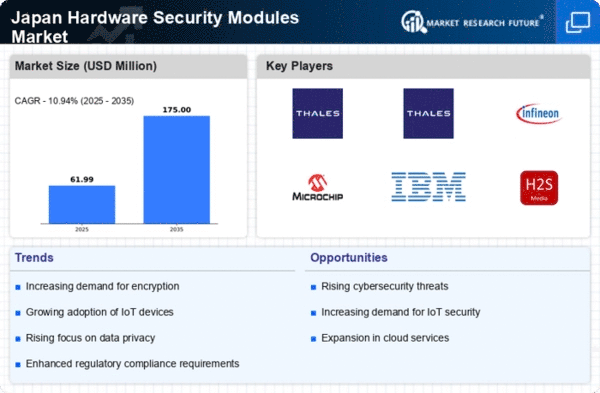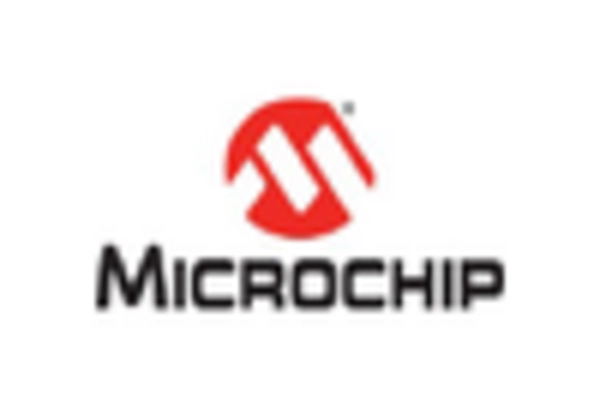Growing Cybersecurity Concerns
The hardware security-modules market. in Japan is experiencing growth driven by escalating cybersecurity threats. Organizations across various sectors are increasingly aware of the potential risks associated with data breaches and cyberattacks. As a result, there is a heightened demand for robust security solutions, including hardware security modules, which provide a secure environment for cryptographic operations. In 2025, the cybersecurity market in Japan is projected to reach approximately $20 billion, indicating a strong focus on protective measures. This trend suggests that businesses are prioritizing investments in hardware security-modules to safeguard sensitive information and maintain customer trust.
Regulatory Compliance Requirements
In Japan, stringent regulatory frameworks are influencing the hardware security-modules market.. Regulations such as the Act on the Protection of Personal Information (APPI) necessitate that organizations implement adequate security measures to protect personal data. Compliance with these regulations often requires the use of hardware security modules to ensure secure key management and data encryption. As companies strive to meet these legal obligations, the demand for hardware security-modules is likely to increase. The market is expected to grow as organizations recognize the importance of compliance in avoiding penalties and maintaining their reputations.
Rising Demand for Secure Payment Solutions
The hardware security-modules market. is also being propelled by the rising demand for secure payment solutions in Japan. With the growth of e-commerce and digital payment systems, there is an increasing need for secure transaction processing. Hardware security modules play a crucial role in ensuring the integrity and confidentiality of payment data. As consumers become more concerned about the security of their financial transactions, businesses are compelled to adopt hardware security modules to enhance their payment security infrastructure. This trend is likely to continue, contributing to the overall growth of the hardware security-modules market.
Increased Investment in Digital Transformation
As Japanese businesses accelerate their digital transformation initiatives, the hardware security-modules market. is witnessing increased investment. Organizations are adopting cloud computing, IoT, and other digital technologies, which necessitate enhanced security measures. The shift towards digital platforms creates new vulnerabilities, prompting companies to invest in hardware security modules to protect their data and transactions. In 2025, the digital transformation market in Japan is expected to exceed $100 billion, indicating a robust trend that will likely drive the demand for hardware security-modules as part of comprehensive security strategies.
Technological Advancements in Security Solutions
The hardware security-modules market. is benefiting from rapid technological advancements in security solutions. Innovations in cryptographic algorithms and secure key management techniques are enhancing the capabilities of hardware security modules. In Japan, the integration of artificial intelligence and machine learning into security systems is becoming more prevalent, allowing for more sophisticated threat detection and response mechanisms. This evolution in technology is likely to drive the adoption of hardware security-modules, as organizations seek to leverage cutting-edge solutions to protect their digital assets. The market is poised for growth as these advancements continue to emerge.
















